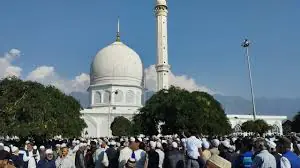Government holiday for Eid rescheduled in Mumbai
Government holiday for Eid rescheduled in Mumbai The Maharashtra government has rescheduled the official holiday for Eid-e-Milad-un-Nabi in Mumbai district from September 16 to September 18. This change likely accommodates the convenience of the public for the observance of Eid-e-Milad, the Islamic holiday marking the birth of Prophet Muhammad. The celebration often includes processions, prayers, … Read more
